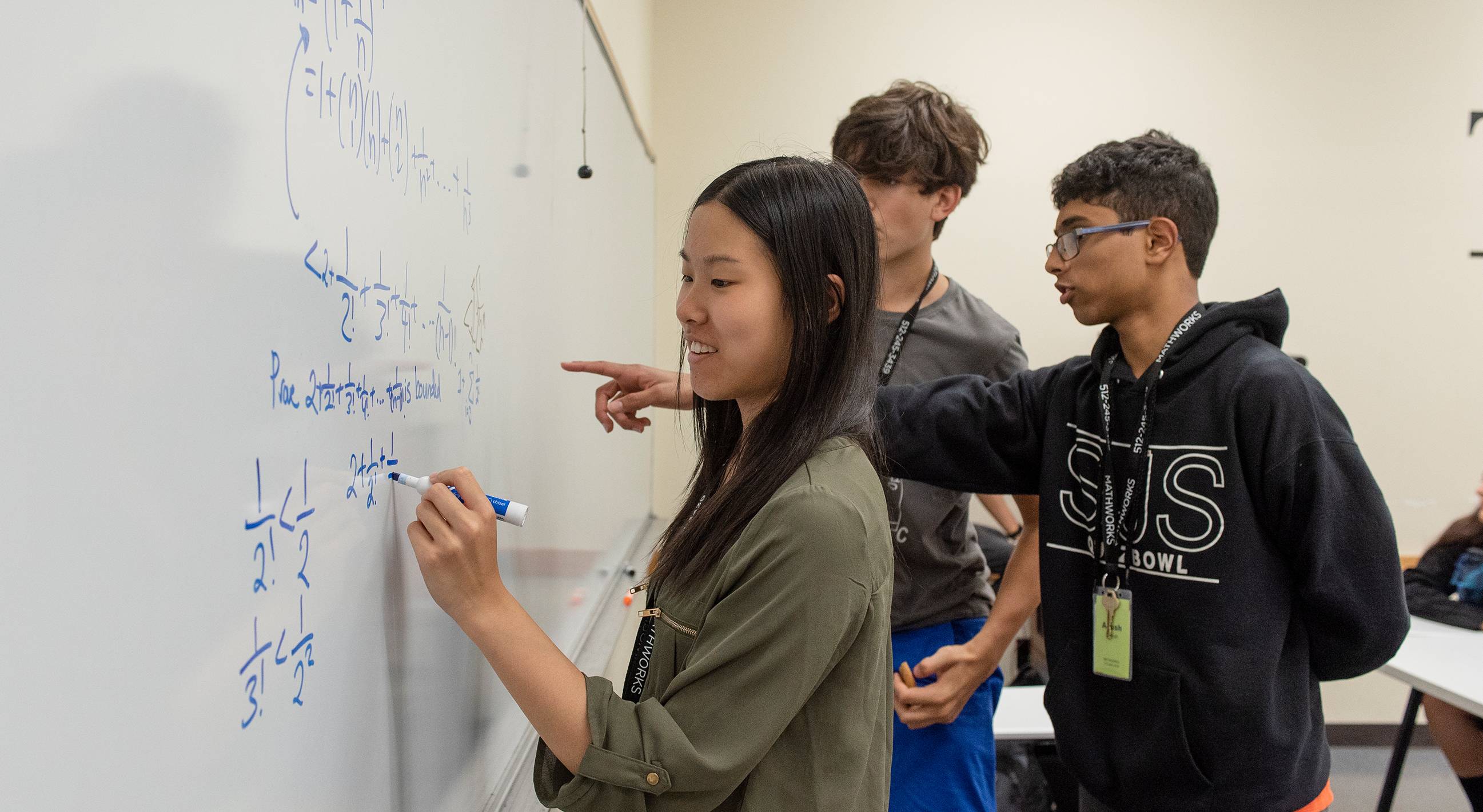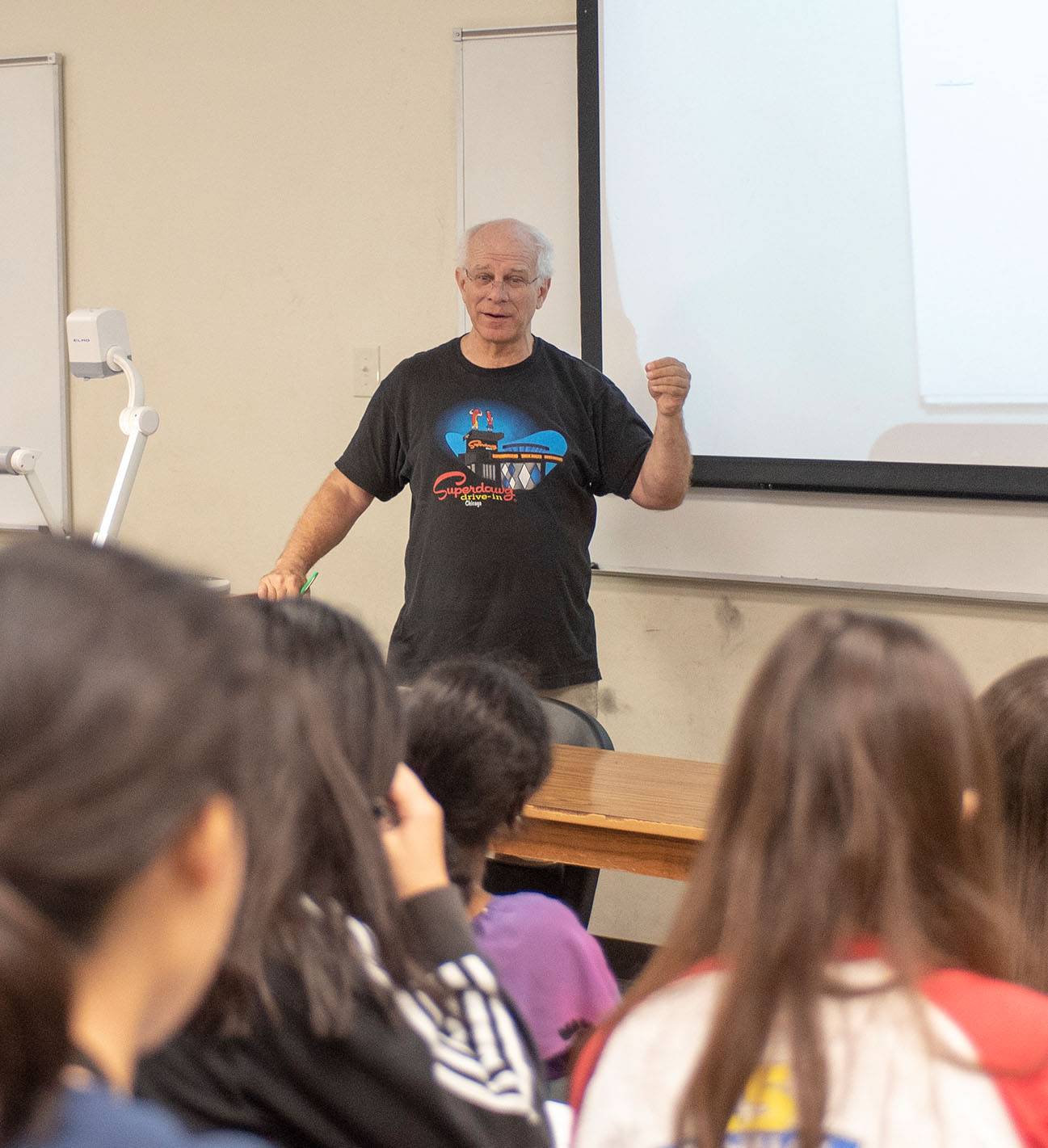
Mathworks - by the numbers
By Susie Phillips Gonzalez
30 years + 8,000 students + 700 teachers + 3 pillars = amazing success
Mathworks, a nationally recognized center of excellence and innovation in mathematics, is celebrating 30 years at Texas State University. Its origins date back half a century to when Dr. Max Warshauer was in high school.
Warshauer, Texas State University System Regents’ Professor of Mathematics and director and founder of Texas Mathworks, attended a summer math camp at Ohio State University in the late 1960s. Surrounded by what he describes as talented high school students from across the country, Warshauer learned how to re-discover and prove time-tested theorems in number theory and to “think deeply of simple things.” He majored in mathematics at the University of Chicago and earned a doctorate at Louisiana State University.
Since arriving at Texas State in 1979, he has taught courses in number theory, calculus, linear algebra, topology, differential equations, and abstract algebra. Warshauer has also advised honors students and doctoral students in mathematics education.
Adding up funds to launch Mathworks
In 1990, he secured a small grant that covered costs for a new summer camp for 12 high schoolers and four Texas State graduate students. Warshauer recalls driving to small towns near San Marcos to recruit campers. In the second year of the program, there was not enough money to pay the faculty. He began the arduous task of seeking grants from national foundations and individual donors to keep the program afloat.
Today, Mathworks has evolved and thrived under the three pillars advanced by Warshauer and initial program faculty members Dr. Terry McCabe and Dr. Don Hazlewood — summer math camps for middle and high school students, curriculum development, and teacher professional development.
During its three decades, the program has reached more than 8,000 students and 700 teachers. It also has earned multiple awards, including the Siemens Founders Award, the Texas Higher Education Star Award, and the Presidential Award for Excellence in Science, Mathematics, and Engineering Mentoring.
Warshauer and his colleagues strive to enhance every student’s love for mathematics through research-based instruction that keeps learning exciting and relevant. “The program is preparing a new leadership in our country so we can be competitive with the best students in the world,” he says.

Solving a mathematics education problem
This summer, Mathworks celebrated its 30th anniversary with panel discussions featuring alumni from each decade, as well as academic colloquia, tubing trips along the San Marcos River, and a barbecue. Among the participants was Dr. Cody Patterson, a former Mathworks student, teacher, and counselor, who joined Texas State as an assistant professor this fall.
Growing up in Weatherford, Patterson had no direct exposure to Texas State and said he was “desperate” to find a program like Mathworks because he had completed every math course his high school offered and wanted to feed his “math obsession.”
Patterson, who eventually earned a doctorate at The University of Texas at Austin in addition to bachelor’s and master’s degrees at Texas A&M University, credits Mathworks professors with helping students grasp concepts and tools needed to solve problems and thus comprehend the major ideas of each course. “I found this to be a powerful experience in shaping my identity as a mathematician, and I try to pass some of this along to the undergraduate students I teach,” Patterson says.
When Dr. Will Boney was a high school freshman in Austin, his math teacher told him about Mathworks. “He was a great teacher and got me excited about math,” says Boney, who was also looking for something to do over the summer. That first experience eventually led to seven summers with Mathworks — first as student, then as a counselor. This fall, Boney joined the faculty of the Department of Mathematics as an assistant professor. He comes to Texas State from Harvard University, where he was a Benjamin Peirce Fellow and a National Science Foundation Mathematical Postdoctoral Research Fellow.
Araceli Fernandez from San Antonio was one of the Honors Summer Math Camp students in the early and mid-2000s who learned how to solve math problems through discovery and not by memorizing the answers. “That is a skill you need everywhere,” says Fernandez, who earned an M.B.A. at the University of Michigan in Ann Arbor after receiving an architectural engineering degree from UT Austin. She is now a manager for an operational improvements company called Partners in Performance. Fernandez says Mathworks also taught her independence, network building, teamwork, and public speaking.
Fernandez says Warshauer was pivotal to her personal growth. “Max was not only a mentor but also a sponsor for me,” she says, noting that her two brothers also attended and benefited from the camp. “I’m one of the students that — without the financial sponsorships he acquired over the years — would have never been able to attend camp. Without his continuous effort and drive, camp would not be as awesome as it is today.”
For his dedication, Warshauer has received a number of awards from the university, the state, and national science organizations. “It’s not an individual award, though,” he says. “It’s the team we’ve built.” The team showcases mathematics professors as well as several computer science and engineering faculty members who have guided Mathworks participants on what Warshauer calls “incredible research projects.”
He adds that the backing of Texas State administrators Dr. Christine Hailey, dean of the College of Science and Engineering, and Dr. Susan Morey, chair of the Department of Mathematics, has been vital to the program’s success. Warshauer is especially appreciative of such organizations as the National Science Foundation, the Siemens Foundation, and the Fund for the Improvement of Postsecondary Education for contributing more than $11 million in grants and donations, as well as for an active and supportive Mathworks Steering Committee.
Calculating a formula for the future
Where does Mathworks go from here? “We want to sustain the Mathworks legacy for future generations,” Warshauer says. “This program reaches out to students who may not have any money at all. Some students can afford to come, but many could not attend the program without support.”
Perhaps most importantly, the Mathworks programs provide a unique setting for preparing future teachers who serve as Mathworks Fellows to research and develop best practices in the teaching and learning of mathematics.
Dr. Dan Perry, assistant vice president for University Advancement, credits Mathworks with echoing the early mission of Texas State as a teaching college and its progression to a university that offers a doctorate in mathematics education. “Mathworks bridges our legacy as a teacher’s college and our vision to become a national research university,” he says. “Over the last 30 years, Mathworks has grown from a small math camp for talented high school students to a thriving research center.
“Texas State seeks to grow the Mathworks endowment to $6 million to provide a sustainable source of funding for faculty and graduate students to pioneer new and innovative methods to advance teacher effectiveness in math education,” Perry says.
In his role as a faculty member, Patterson hopes to extend the program’s outreach to students who need academic enrichment in mathematics. He says Mathworks can be a space for learning how students think mathematically and how teachers develop their skills. “Mathworks is an ideal place for doing cutting-edge work at the intersection of research and practice in mathematics education,” Patterson says. “We have the opportunity each summer to work with hundreds of enthusiastic children in a setting where they are not bound to a specific curriculum, pacing calendar, or end-of-course exam.” ✪